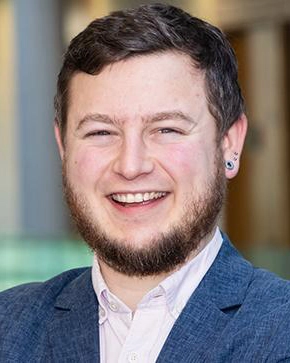About Us
An International Advisory Committee comprising leading researchers and senior members of the policing and policy communities from the UK and around the world has been appointed to advise on the strategic direction of SIPR with respect to its key aims of conducting relevant research, making evidence-based contributions to policing policy and practice, and capacity building. The International Advisory Committee will also help identify opportunities for SIPR to engage in research and knowledge transfer activity in partnership with others at both national and international levels.
Profiles of the members of the International Advisory Committee are presented below.

Gary Ritchie is a Managing Partner in the Global Consortium Group(GCG). Prior to this he was an Assistant Chief Constable with Police Scotland, retiring in 2025 after 34 years policing service. During his time as a member of the Police Scotland Executive team he oversaw portfolios and directorates for Organisational Change; Partnerships, Prevention and Community Wellbeing, International Policing Development and Operational Support.
He was appointed Assistant Chief Constable in 2019 and during his tenure, he oversaw directorate of Partnerships, Prevention and Community Wellbeing where he developed new public health led approaches in partnership with other public services to reduce and prevent harm and achieve better outcomes for communities and vulnerable people. As head of Drug Strategy, he compiled the first specific drug strategy for Police Scotland, shifting the emphasis from enforcement to harm reduction. As part of this new approach, he led the roll out of Naloxone (Narcan) to police officers which has resulted in Scotland becoming the first nation in the world to equip all its frontline police officers with nasal Naloxone. Since then Police Officershave regularly used Naloxone in cases where people have taken overdose, helping to savehundreds of lives.
He also led on the establishment of Police Scotland’s International Academy, founded on the principles of police senior leadership development through international study, engagement and networking. He established several internal policing leadership development programmes with police agencies in the USA, Australia, South East Asia, South America and Africa based around principles of Values Based/ Adaptive Leadership, strategic incident command, leadership modelling for conflict de-escalation, policing culture and international collaboration.
Gary also sat on the board of the Scottish Institute of Police Research, a nexus of 8 Scottish Universities in partnership with policing and supporting post-graduate research reflecting the most prominent policing and societal issues in order to assist policing in the development of evidence-based policy and practice. He has recently taken on the Chair of SIPR’s International Board He was awarded the King’s Police Medal in 2025 and, in recognition of his collaboration with academia over the past few years, he was made an Honorary Professor of Edinburgh Napier University. Following his retirement from policing he emigrated to Australia and lives in Sydney.
Professor Nick Bland was a co-director of What Works
Scotland until September 2017 and led on the Spread and
Sustainability workstream. He is now at the Scottish Government.
Nick was the lead for the case site work with Aberdeenshire
Community Planning Partnership which is examining the critical dimensions
which influence how effective change and improvement initiatives can be
‘spread’ from one context to another, and can be ‘scaled-up’ as a contributor
to system-level change.
He also explored collaborative leadership and workforce
development.
A Visiting Professor at the School of Social and Political
Sciences at the University of Edinburgh, Nick has 20 years’ experience in
social and public policy as a researcher, research funder and practitioner in
both United Kingdom and Scottish governments.

Professor Nick Crofts is an epidemiologist and public health practitioner who has been working in the fields of HIV/AIDS, illicit drugs, harm reduction and law enforcement for over 30 years. His major epidemiological work has been on the control of HIV and hepatitis C among injecting drug users in Australia (for which he received an NHMRC Senior Research Fellowship) and globally, including almost every country in Asia, for which he received the International Rolleston Award from the International Harm Reduction Association in 1998, and was made a Member of the Order of Australia in 2018. Through the Centre for Law Enforcement and Public Health, of which he is founding Director, he founded the Law Enforcement and HIV Network (LEAHN) in 2009, and is Director of the annual Law Enforcement and Public Health Conferences (LEPH2019, Edinburgh, October 2019) from which the Global Law Enforcement and Public Health Association has grown.

John R. Firman is a Professor of Practice at American University, in the School of Public Affairs, Department of Justice, Law and Criminology. Prior to joining AU, he served as Director of Research (1994-2016), and Director of Strategic Partnerships (2016-2018) for the International Association of Chiefs of Police. IACP is one of the world’s largest and most influential police leadership organizations, with 30,000 members representing 120 countries. His duties included development and implementation of a national and international law enforcement policy research and evaluation program. He helped create and manage the National Law Enforcement Policy Summit Series, addressing current and emerging issues in the policing profession.

Bisi Akintoye is a lecturer and solicitor whose research focuses on the intersection between race, drugs, policing, and empire. Her research takes a qualitative and ethnographic approach to racialised policing, exploring how race produces the disproportionate policing of Black British communities in London. Bisi’s work applies an intersectional equity lens to racialised policing, and explores how ethnicity, gender, age, class and immigration histories affect policing experiences.
Previous research also includes gendered cultures in occupational policing for the University of Kent and she recently contributed to an evaluation of multi-agency public protection arrangements in the UK with Anglia Ruskin University. Bisi has also previously worked with RAND Europe in the Health and Social Policy team focusing on criminal justice matters.
Bisi has been a board member of Release, with a focus on drug policy in the UK, since 2021.
Dr Victoria Herrington is Director of Research and Learning at the Australian Institute of Police Management, a role she has held since 2011, prior to which she was Adjunct Professor at Western Sydney University. She is an applied criminologist, working at the intersect between the academic and public safety practitioner worlds. She is committed to supporting excellence in professional practice, and believes that academic insights from across a range of disciplines have much to offer those working in public safety. Her particular areas of interest include leadership and management, leader and leadership development, organisational justice, strategic policing partnerships, and the policing of vulnerable groups.

Dr Vesa Huotari has been a senior researcher at the Police University College of Finland since 2006. He describes himself as a versatile and innovative scrutiniser of problems. Generally, questions of methodology, administration, management, leadership and education characterise his interests in research. The method he appreciates most and also pursues to practice in his writings is thinking – can we make it work in theory first? He believes in joint learning, built upon criticism and open exchange of ideas, experiences, and insights across fields and borders of all kinds.
Sofie De Kimpe is Professor of Criminology at the Department of Criminology at the Vrije Universiteit Brussel (VUB). She teaches subjects on Policing, security policy and Criminological methodology. She started her criminological career at Ghent University with a PhD study on discourses of senior police officers, a sociological study of chief constables of the local police in Flanders. From 2009 to 2013 she worked as an academic expert for the Minister of Internal Affairs and the Belgian Federal police, managing a project ‘police, a learning organization’. The project intended to rethink the Belgian police education system and implement a bachelor and master program for police studies within the Belgian Police. In 2013 she returned to the University of and since 2018 she has been vice-chair of the department of criminology. She is chair of the EU COST ACTION network on POLICE STOPS. She is a founding member and member of the steering group of the ESC Working Group on Policing.

Cynthia Lum is a Professor of Criminology, Law and Society at George Mason University and Director of its Center for Evidence-Based Crime Policy. Her research focuses on policing tactics, strategies, technology, and organization, crime prevention and deterrence, and evidence-based crime policy. With Professors Christopher Koper and Cody Telep, she has developed tools to help translate research into practice.

Prof. Monique Marks currently heads up the Urban Futures Centre at the Durban University of Technology (UFC@DUT). Initially trained as a social worker, she has a doctorate in Sociology from the University of Natal. She has worked mainly as an (activist) academic but has also worked in an NGO (the Centre for the Study of Violence and Reconciliation) and for the African National Congress in the period leading up to the first national democratic elections. Monique writes predominantly in the field of criminology and urban studies. She has published widely in the areas of youth social movements, ethnographic research methods, police labour relations, police organizational change and street level drug use.

Dr. Vesa Muttilainen is the Director of Research at the Police University College in Tampere. Currently he is a member of the Board of directors, and responsible for research and development processes.
His scientific interests have focused especially on financial crime themes such as corruption and economic crime investigation. He also has edited four extensive reports on the Police’s operating environment between 2012 and 2018.
In international context he has served as a member of CEPOL’s research working group and a co-editor of Research & Science Bulletin. He is an associate editor of the Nordic Journal for Policing Research. Recently he has been involved in a large capacity building project on security education (EU-Twinning).
Dr Rick Muir is Director of the Police Foundation, the UK’s independent policing think tank. He has been a public policy researcher for most of his career, most latterly working on public service reform, including on policing and criminal justice policy, at the Institute for Public Policy Research (IPPR). Prior to that he did his DPhil in Latin American politics at the University of Oxford. He is currently a Visiting Professor at Northumbria University, a Fellow of the Royal Society of Arts, Manufactures and Commerce (RSA) and a member of the Cumberland Lodge Police Steering Committee. He was previously a local councillor in both Oxford and Hackney. Dr Rick Muir joined the IAC in April 2019, suceeding John Graham, Former Director of the Police Foundation, who had been a Founding Member of the IAC since 2007.

Mr Martin Smith is the Strategy Programme Lead at the Scottish Police Authority, responsible for supporting the Authority’s strategic development and overall approach to commissioning research and evidence gathering activities and using insights from analysis to shape planning. He has been at the Authority since 2015, having worked previously in a data analytics and strategic intelligence capacity in a number of UK police forces, including Police Scotland, Strathclyde Police, and Bedfordshire Police extending back to 2003. His background prior to joining the world of policing is in social geography and demography, having been a Postgraduate Researcher at the University of Oxford’s Department of Social Policy and Social Work.

Dr Richard Southby is Distinguished Professor of Global Health and Executive Dean Emeritus, Milken Institute School of Public Health, The George Washington University, Washington, DC, USA. Dr. Southby is also Honorary Professor, Faculty of Medicine, Dentistry and Health Sciences, The University of Melbourne; Faculty of Medicine, Nursing and Health Sciences, Monash University; and Faculty of Medicine, The University of Sydney, Australia. In addition to being the Founding Director of the Police Science Program at The George Washington University, Dr. Southby has been affiliated with police education and training programs in Australia, Canada, Hungary, Malaysia, New Zealand, Thailand and the United Kingdom.

Nerys Thomas is Interim Director What Works at the College of Policing, helping the service to identify, share and use evidence about what works. She also has responsibility for the College’s work on performance improvement and prevention. Nerys has been working in policing and criminal justice research for over 21 years and prior to joining the College, held various roles in the Home Office, the Office for Criminal Justice Reform and the National Policing Improvement Agency. She has carried out and published research on a wide range of issues including police demand, vehicle crime, police investigations, use of forensics and intelligence. She has also been seconded to a government-led criminal justice reform project focusing on the Human Rights Act. Before joining the Home Office, Nerys completed a Master of Science degree in Criminology and Criminal Justice at the University of Wales, Cardiff.

Dr. Ian D. Marder is Assistant Professor in Criminology at Maynooth University in the Republic of Ireland, where he teaches restorative justice, policing and victimology, chairs the MA in Comparative Criminology and Criminal Justice, and is Director of Outreach and Engagement for the School of Law and Criminology. His research explores the development and implementation of restorative justice and restorative practices in the criminal justice, higher education and community sectors. He is a coordinator of Restorative Justice: Strategies for Change, a project in which partners from ten European countries are collaborating to implement restorative justice in criminal justice settings. Ian is also an active member of the European Forum for Restorative Justice.

Saniye Çelik holds the position of Special Professor of Diversity and Inclusion at the Police, affiliated with the National Police. Her research interests encompass leadership and culture, creating safe and inclusive teams, personnel recruitment and retention, and fostering connections between public organizations and society.
Since 2023, Saniye Çelik has held the special chair of Diversity and Inclusion at the Police, associated with the National Police. Her research focuses on diversity, leadership, and developing an inclusive culture within public organizations. Her work seeks answers to several key questions, including:
Additionally, her research considers societal developments that intersect with the functioning of organizations:
Dr. Çelik has devised the Inclusion Scan for individuals, teams, and organizations. In addition to her role as a professor at Leiden University, she serves as a professor of Diversity and Inclusion at Leiden University of Applied Sciences.